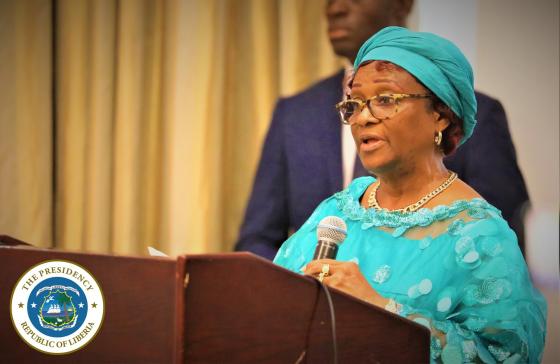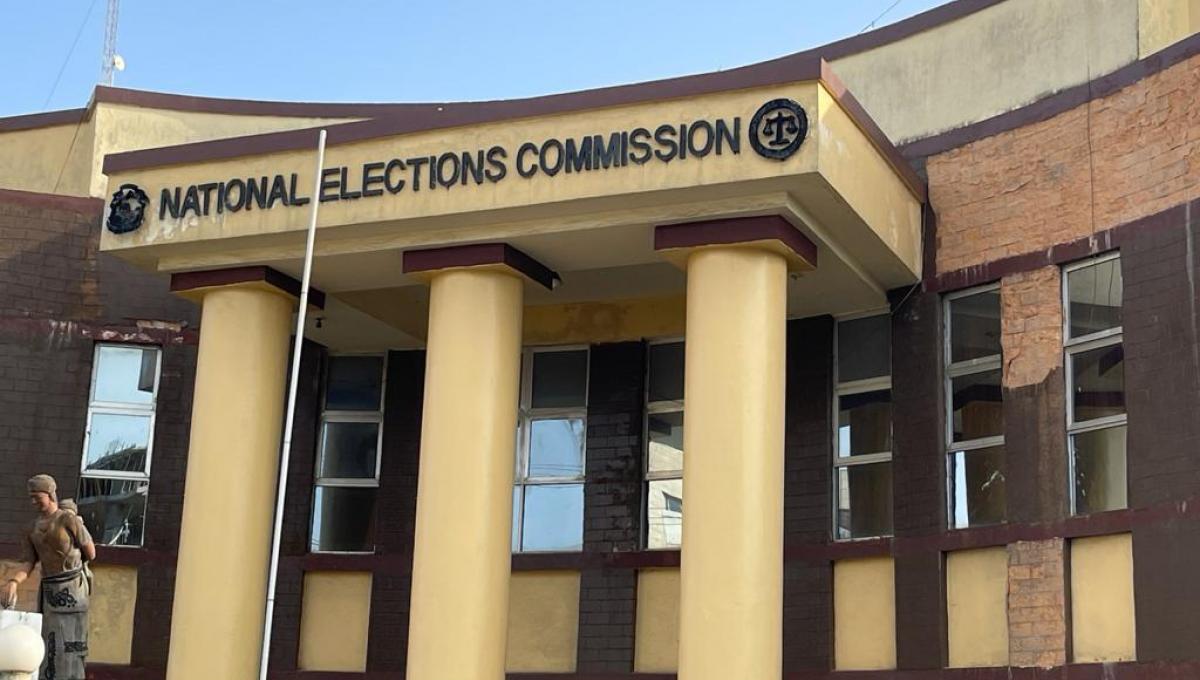Liberia: ‘Voters Registration Awareness Marred by Shortcoming,’ NEC Says

The Chairperson of the National Elections Commission, Davidetta Brown Lansanah speaks at the signing ceremony in early April.
— “The resources the commission has is what is being used. At the local level people had to be informed, but we have constraints and, if we had the resources, we would have been everywhere,” says Davidetta Brown Lansanah, the electoral body chair,
The National Elections Commission has admitted that its voter registration awareness has failed to reach millions of potential voters.
The Commission however blamed its failure on budgetary cuts by the government, a situation which, it claims, limits its ability to reach out to more voters, especially those living in rural and remote areas with voter registration awareness, since this would be the country’s first experience with biometric voter registration.
“The resources the commission has is what is being used. At the local level people had to be informed, but we have constraints and, if we had the resources, we would have been everywhere,” said Davidetta Brown Lansanah, chairperson of the National Elections Commission at the official launch of the Civic and Voter Education excise for phase two counties in Ganta, Nimba Country about two days ago.
The rare admission from the NEC comes as the second phase of the biometric voters' registrations in nine counties kick off on April 21 after registering 1.4 million people during the first phase which was marred by technical failures of equipment and limited voter registration awareness.
The revelation is a significant blow to the public trust in the Election Commission, as voter registration awareness is a fundamental cornerstone in increasing voter turnout in poor countries like Liberia, which has high illiteracy rates and a huge rural population that has limited access to information.
In time past, the Commission’s voter registration awareness was initiated months ahead. However, for the 2023 election, which is expected to be the most contested election in Liberia’s postwar history so far, the process started just a few days before the beginning of voter registration and is mostly limited to urban settlements with many hard-to-reach rural areas left out.
“Civic Education of Voter Registration is supposed to be all year round and we are supposed to be everywhere, but it is not possible now,” the NEC Chair said. “We made a budget that is supposed to carry us everywhere. [But] that budget [was] just brought down and what is left is what we are using.”
The Commission’s complaint of reduced funding is an open secret as its budget of little over US$90 million for the conduct of the 2023 elections was slashed to US$53 million.
Yet, the Commission complained of not receiving the funding on time even after starting the first phase of the biometric voter registration on March 20, until recently, when the government disbursed the US$27.5 million, leaving a balance of US$25.5 million.
The budget cut and delay in disbursing funds, according to experts, has had a significant impact on the Commission’s ability to undertake key tasks such as increasing public awareness around voter registration, which is needed to provide information to the vast majority of the country's uneducated population about the specifics and mechanics of the registration.
The phase-two counties are Bong, Grand Gedeh, Grand Kru, Lofa, Maryland, Nimba, River Gee, River Cess, and Sinoe. Liberians who are above 18 years of age living in these counties are eligible to register, NEC says.
Meanwhile, Lansanah, the electoral body chairperson, has called on potential voters to be patient at the voter registration centers.
“Be patient to obtain your voter card and avoid rushing when you reach the registration center and try to show that you are Liberian if the registrar doubts about your being Liberian,” Lansanah said.
“You can show your citizen ID card or any relevant document and you can also bring someone to prove that you are from Liberia.”
The appeal comes as the Commission’s biometric equipment during the first phase of the voter registration exercise in six counties caused delays, which left many frustrated and, in some cases, people unable to register.
One common technical issue was the longest amount of time it took for the solar panels to power up the biometric machines. Another issue was the frequent shortage of biometric cards.
However, the NEC has constantly claimed that the overall impact of the technical problems on the turnout of voter registration exercise was minimal and had little impact as some people claimed.
But electoral experts disagree, saying that the total number of registered voters in the first phase would have been significantly higher if the problems had not existed throughout the registration period.
“If people get impatient and leave because the system breaks down and they don’t come back to register, we may not register enough eligible voters,” said Oscar Bloh, an expert on the Liberian electioneering process.
In phase one, Montserrado and Margibi Counties had the largest shares of registered voters: the former with 891,201 and the latter with 184,425, which is still better than the remaining four counties.
Bomi and Grand Cape Mount Counties, which are among the poorest in the country, recorded 64,395 and 86,589 registered voters, respectively. Grand Bassa County, one of the wealthier counties, recorded 157,712 registered voters.

